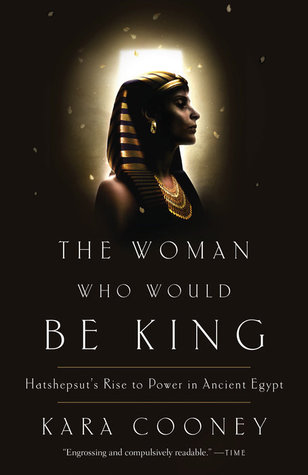|
Synopsis: An engrossing biography of the longest-reigning female pharaoh in Ancient Egypt and the story of her audacious rise to power. Hatshepsut—the daughter of a general who usurped Egypt's throne and a mother with ties to the previous dynasty—was born into a privileged position in the royal household, and she was expected to bear the sons who would legitimize the reign of her father’s family. Her failure to produce a male heir was ultimately the twist of fate that paved the way for her improbable rule as a cross-dressing king. At just over twenty, Hatshepsut ascended to the rank of pharaoh in an elaborate coronation ceremony that set the tone for her spectacular reign as co-regent with Thutmose III, the infant king whose mother Hatshepsut out-maneuvered for a seat on the throne. Hatshepsut was a master strategist, cloaking her political power plays in the veil of piety and sexual reinvention. Just as women today face obstacles from a society that equates authority with masculinity, Hatshepsut shrewdly operated the levers of power to emerge as Egypt's second female pharaoh. Hatshepsut successfully negotiated a path from the royal nursery to the very pinnacle of authority, and her reign saw one of Ancient Egypt’s most prolific building periods. Scholars have long speculated as to why her monuments were destroyed within a few decades of her death, all but erasing evidence of her unprecedented rule. Constructing a rich narrative history using the artifacts that remain, noted Egyptologist Kara Cooney offers a remarkable interpretation of how Hatshepsut rapidly but methodically consolidated power—and why she fell from public favor just as quickly. The Woman Who Would Be King traces the unconventional life of an almost-forgotten pharaoh and explores our complicated reactions to women in power. |
I have been a fan of all things Ancient Egypt from a very young age, so I was excited to have the opportunity to choose The Woman Who Would Be King from Blogging for Books. Hatshepsut has always been an enigma, a woman ruling as a man, then being struck from the historical record after her death by having her name chiseled away and her statues and liknesses altered and re-purposed.
The Woman Who Would Be King is a biographical speculation on what Hatshepsut's life may have been like, bolstered by Cooney's extensive archeaological knowledge, encompassing the daily life of ancient Egyptian royalty with all it's privileges and responsibilities. What she presents is the story of a woman, who from the moment she was born was expected to fulfill a purpose she had no say in, to be the wife of her brother, the king, to bear an heir to continue the line, and serve as a high priestess. When that purpose came to a pre-mature end, her brother died young, and she was still quite young herself, her story diverges into something amazing that could only have been brought about through her intelligence and cooperation of those around her.
Cooney gives us a glimpse into the immense responsibility and the expectations visited upon the rulers of Egypt, often at a young age, sometimes with the help of parents or older sibling/spouses ruling as regents, court officials that may have been friends or may have had their own agendas. Treacherous and demanding waters for anyone to navigate. We are fascinated by the exotic-ness of Ancient Egypt, by sexual practices that are taboo in our society but were common practice there, the riches we've seen these kings and queens surrounded by and buried with, the paintings, temples and statues. Cooney gives us a more realistic picture of the time, the illnesses that were prevalent, the politics and rituals, and to me it's far from a position I would want to find myself in! This climate makes Hatshepsut's story even more amazing. Cooney presents some views on how her kingship came about that seem quite plausible, with all indications that she was a good ruler, and that perhaps the destruction of her legacy was not due so much to personal enmity, but political expediency, to solidify her nephew's kingship and the future of his line.
I actually ended up checking out the audio book of The Woman Who Would Be King, as I felt this book had languished on my TBR pile long enough and I was a little over extended on physical books. I was pleasantly surprised to find that not only is the author herself the narrator, but that she does an excellent job and it was very enjoyable to listen to. Cooney brought Hatshepsut to life with beautiful language and the passionate performance of an academic to whom she was not just a historical figure, but a very real person.


No comments:
Post a Comment